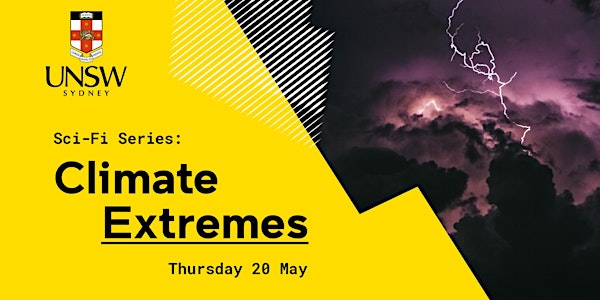
Sci-Fi Series: Climate Extremes
What exactly is a one-in-a-100-year weather event? And why do they keep happening so often?
Date and time
Location
Online
About this event
We invite you to join us for the next webinar in the Sci-Fi Series: Climate Extremes on Thursday 20 May from 12:30pm AEST, which will explore why extreme weather and climate events are increasing in frequency across the globe, how they compare to past events, and how they might evolve in the future.
Our expert panel will discuss current research into the processes that trigger or enhance these extremes, how scientists are building this understanding into our modelling systems, and how predictions of climate extremes will help us cope with them - both now and into the future.
If you are unable to tune in for the live-stream, we will also be recording the event. Please be sure to register so we can send you the link to the recording post-event.
______________________________________________________________________________________________________
PANELLISTS:
Professor Emma Johnston AO – Dean, UNSW Science
Professor Emma Johnston AO FTSE FRSN is Dean of Science and Professor of Marine Ecology and Ecotoxicology at UNSW Sydney. She studies the impacts of human activities in marine ecosystems and how we can build ecological resilience. A highly awarded scientist, educator and communicator, Professor Johnston is a national advocate for the Science and Technology sector. She is Co-Chief Author of the Australian Government’s State of Environment Report, and a Director on the Board of the Great Barrier Reef Marine Park Authority. She consults with industry through the development and implementation of new biomonitoring and ecological engineering techniques and frequently contributes expert opinion to state, federal and international agencies. She is also a highly sought-after science communicator and television presenter for the ongoing BBC/Foxtel series, Coast Australia.
Professor Andy Pitman AO - Director, ARC Centre of Excellence for Climate Extremes, UNSW Sydney
Professor Andy Pitman AO is Director of the ARC Centre of Excellence for Climate Extremes and Professor in climate science at UNSW Sydney. He has 35 years’ experience and broad interests extending across climate modeling, climate change, and climate extremes. Andy has been a lead author on the Intergovernmental Panel on Climate Change (IPCC), contributing to the award of the Nobel Peace Prize to the IPCC in 2007. He has had multiple senior advisory roles in climate science for the Federal Government, the NSW State Government, as well as senior national roles in e-research infrastructure strategy. He won the Priestley Medal in 2004, the AMOS Medal in 2009, the NSW Climate Scientist of the Year in 2010 and Royal Society of Victoria medal in 2020.
Professor Moninya Roughen (BSc Hons '98, PhD '02) - Group Leader, Coastal and Regional Oceanography Lab , School of Mathematics and Statistics, UNSW Sydney
Moninya Roughan is a professor of physical oceanography at UNSW Sydney, with expertise in the dynamics of coastal ocean circulation. Her research focuses on improving understanding of the East Australian Current, cross shelf exchange, coastal ocean circulation, upwelling, marine heatwaves and the biological implications, using a combination of modern ocean observations and numerical models. Over the past decade, Moninya has been instrumental in the design, deployment and ongoing development of one of the most comprehensive ocean observing systems in the world. Through her leadership role in Australia’s Integrated Marine Observing System she has built vast ocean observational datasets critical for understanding coastal processes and improving ocean prediction along the length and breadth of the East Australian Current System.
Dr Nina Ridder (PhD '14) - Research Associate, ARC Centre of Excellence for Climate Extremes, UNSW Sydney
Nina joined the ARC Centre of Excellence for Climate Extremes in the beginning of 2019 after working as a Research Fellow in The Netherlands at the Royal Netherlands Meteorological Institute (KNMI) and European Space Agency. Her current work focuses on compound climate and weather extremes, and extreme precipitation. As such, Nina addresses the occurrence of multiple natural hazards that have been associated to the most severe socio-economic damages and investigates multivariate hazards on the global scale to establish possible spatio-temporal links between different regions and their natural hazards around the world. Nina is a graduate of UNSW, having completed a PhD in Climate Science in 2014.